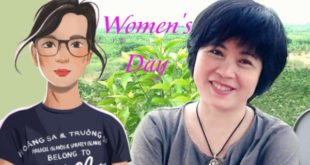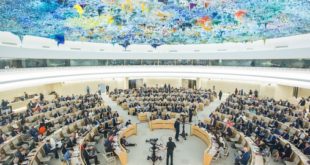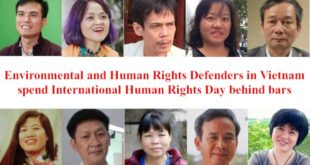
GENEVA, 20th June 2006 – As the new United Nations Human Rights Council begins its first session in Geneva this week, Vo Van Ai, President of the Paris-based Vietnam Committee on Human Rights and Vice-President of the International Federation of Human Rights (FIDH), wrote to UN Secretary-general Kofi Annan, the UN High Commissioner on Human Rights, Louise Arbour and the President of the UN Human Rights Council, Luis Alfonso de Alba to draw their attention to the gross and systematic human rights violations in Vietnam, which he qualified as “a veritable blight on humanity”.
Mr. Ai called on the new UN Human Rights Council to address the situation in Vietnam as an urgent priority, stating that Vietnam was “seeking to become a full member of the international community whilst cynically disdaining its binding obligations to respect human rights”.
Annexed to his letter was a new report by the Vietnam Committee entitled “2006 : Grave Violations of Human Rights in Vietnam” with a detailed overview of “Vietnam’s policy of complete lack of dialogue with UN human rights mechanisms combined with systematic abuses of its citizens fundamental rights”. (See full text).
The document describes political repression orchestrated at the highest levels of the Vietnamese Communist Party and State, and the regime’s total non-compliance with UN human rights mechanisms. Vietnam has systematically refused to invite UN Special Rapporteurs (on Freedom of Expression, Freedom of Religion etc.) to visit Vietnam since 1998, when the then UN Special Rapporteur on Religious Intolerance, Abdelfattah Amor issued a highly critical report on the religious freedom and human rights situation following his in situ visit. Moreover, the government fails to submit mandatory periodic reports (due every 2 years) on its implementation of UN treaties ratified by Vietnam. Its report on the UN International Covenant on Social, Economic and Cultural Rights, one of the UN’s key human rights treaties, is overdue since 1995. Concerning the International Covenant on Civil and Political Rights, not only has Vietnam taken no heed of the UN Human Rights Committee’s recommendations to bring Vietnamese laws into line with international human rights law, but has done exactly the opposite, adopting extensive new legistation to “codify” political repression and stifle peaceful dissent.
l Indeed, on the very eve of the UN Human Rights Council’s first session, where Vietnam will take the floor today, the government adopted new regulations on “Administrative Sanctions on Cultural and Information Activities” (Decree 26/2006-ND-CP, signed 6.6.2006, effective on 1 July 2006). The new Decree enables the authorities to punish offences not stipulated in the Criminal Code, and imposes exorbitant fines of up to 30 million dong (2,000 US dollars, i.e. 7.5 times the average annual wage of a Vietnamese worker), for circulating “harmful” information by any means (internet, newsprint, radio…). What exactly constitutes “harmful information” will be decided by the local authorities and Police.
Article 17 of the new decree, concerning the Internet, virtually submits all use of the Internet and circulation of E-mails to prior permission by the State. Clients of Internet cafés must inform the owners of their on-line activities, or risk a heavy fine. Similarly, Internet café owners will be fined if they allow their clients to access “harmful” material. Sending or receiving E-mails overseas is punished by heavy fines. On 1st July 2006, when the Decree takes effect, the government is also launching a 3-month, nationwide campaign of Police controls on all Internet providers, Internet cafés, hotels and any other establishment that provides Internet access in Vietnam in order to “crack down severely on all offenders”.
Article 21 imposes strict new controls on Vietnamese journalists, severaly curbing freedom of expression and the scope of investigative journalism. Under the new regulations, journalists can be fined for publishing stories with anonymous sources, and must submit the text of interviews to the censorship of interviewees. Revealing “Party or State secrets” is severely punished (fines of up to 30 million dongs/2,000 dollars). These new restrictions come just months after journalists revealed a massive corruption scandal in the State-controlled press involving top-level party and government officials, and after Premier Phan Van Khai called for “punishments” against journalists who reported on the scandal.
l Vietnam refuses to comply with the UN Human Rights Committee’s demand in 2002 to provide lists of prisons and prisoners, and the government claims that there are “no political prisoners in Vietnam”. However, Mr. Vo Van Ai informed the UN Human Rights Council of two recent lists of political and religious prisoners compiled by former political prisoners in Vietnam. The first is by cyber-dissident Nguyen Khac Toan, condemned to 12 years in prison in 2002 and released due to international pressure in February 2006. In a document dated 12 May 2006, which describes appaling detention conditions in Vietnam’s prisons and camps, he said that 241 political prisoners were detained in just one Section of Ba Sao Prison (Nam Ha, northern Vietnam) where he was incarcerated, 225 of whom are ethnic Christian Montagnards arrested in the 2001 and 2004 demonstrations. He named several political prisoners serving 20-30 year sentences.
The second list, compiled by UBCV monk Thich Thien Minh, released in February 2005 after 26 years in re-education camp, contains the names of 66 religious and political prisoners, many of them old and sick, in Z30A Camp in Xuan Loc, Dong Nai province (southern Vietnam). Many of these prisoners have been detained for decades and are obliged to perform hard labour despite their poor health.
l In its report, the Vietnam Committee on Human Rights also denounced Vietnam’s policy of religious freedom “for export only”. Whereas increased freedom of worship is tolerated for State-sponsored religions, true freedom of religion is ruthlessly repressed. The Patriarch of the outlawed Unified Buddhist Church of Vietnam (UBCV) Thich Huyen Quang and his Deputy Thich Quang Do remain prisoners in their Monasteries, and are routinely arrested by Security Police each time they step outside. Despite Vietnam’s claims that both monks are “completely free”, the UN Working Group on Arbitrary Detention has proclaimed them victims of arbitrary detention, and called for their immediate release (Opinion 18/2005).
Moreover, Vietnam continues to wage a systematic campaign of harassment, detention, interrogations and threats against members of UBCV Provincial Representative Boards set up to provide spiritual and humanitarian assistance to poor people in 13 provinces and towns in central and southern Vietnam. UBCV monks Thich Chon Tam (An Giang province), Thich Thien Minh (Bac Lieu), Thich Tam Lien (Binh Dinh), Thich Nhat Ban (Dong Nai), Thich Vinh Phuoc (Ba Ria-Vung Tau), Thich Thanh Quang (Da Nang), Thich Thien Hanh (Hue), Thich Vien Dinh and Thich Khong Tanh (Ho Chi Minh City), have all been subjected to Police harassment to force them to disband the local boards and cut off all contacts with the UBCV. Buddhist nun Thich Nu Thong Man was expelled from Dich Quang Pagoda in Khanh Hoa province on 1st June 2006 after months of ceaseless intimidation.
In the light of this continued repression, recent pledges by Vietnam’s leaders to the international community to re-establish the UBCV’s legal status on condition that it changes its name and excludes dissidents Thich Huyen Quang and Thich Quang Do from the leadership are simply a ploy to “neutralise” the UBCV and seek Vietnam’s removal from the U.S.’s blacklist of “Countries of Particular Concern”.
 Quê Me Quê Me: Action for democracy in Vietnam & Vietnam Committee on Human Rights
Quê Me Quê Me: Action for democracy in Vietnam & Vietnam Committee on Human Rights




